Disney+ - Turning Red : A Q&A with director Domee Shi and producer Lindsey Collins
By Mulder, Paris, Cinema Silencio des Près, 22 february 2022
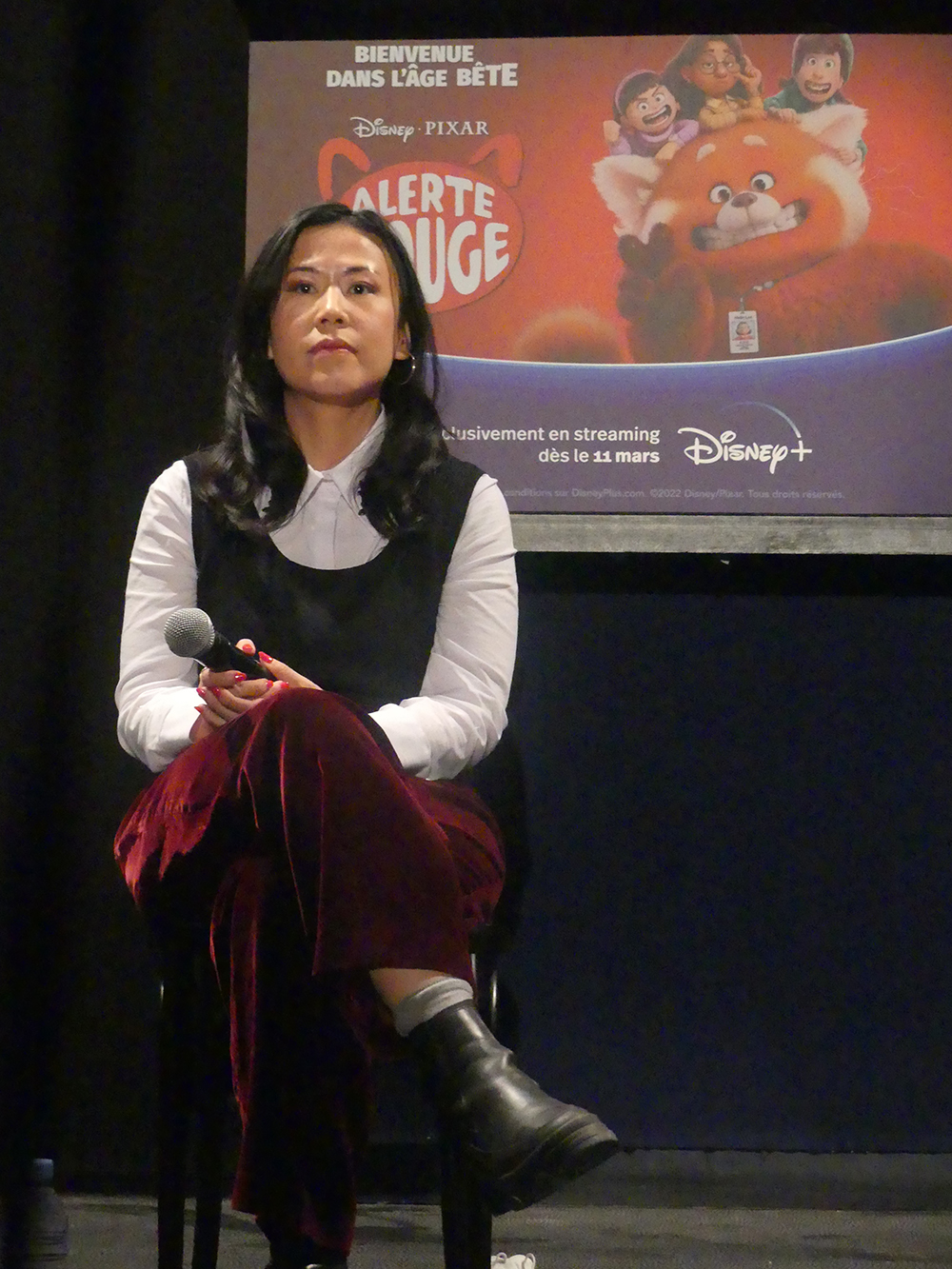
Turning Red is an upcoming American computer-animated coming-of-age and fantasy comedy film produced by Walt Disney Pictures and Pixar Animation Studios to be distributed by Walt Disney Studios Motion Pictures on Disney+. It is directed by Domee Shi (in her feature directorial debut) from a screenplay by Shi and Julia Cho. The film stars the voices of Rosalie Chiang, Sandra Oh, Ava Morse, Maitreyi Ramakrishnan, Hyein Park, Orion Lee, Wai Ching Ho and James Hong. It is the first Pixar film to be solely directed by a woman, to take place in Canada, and second to feature an Asian lead character after Up. Turning Red is scheduled to be released on Disney+ on March 11, 2022, in countries where the service is available. It will be released theatrically in countries without the streaming service.
We were present at a special screening in Paris February 22 with the director Domee Shi and producer Lindsey Collins. You can found below our transcription of this Q&A.
Q : let me start with you this is. This is such a personal story for you. Can you talk to us a little bit about. what inspired it and it really seems like it's a nice evolution from Bao your short film and i was wondering if it felt that way for you too ?
Domee Shi : so like you said it is kind of like the spiritual successor to Bao i realized i had a lot more to kind of explore and unpack in that mother-child relationship dynamic but between a mother and a daughter instead of a mother and a son. i really just wanted to make a film for the 13 year old version of myself to kind of let her know that all of the changes that are happening to your body to your emotions to hair in places where there was no hair before all of that is normal and it's messy and it's frightening and it's embarrassing but you will survive and you will get through this and everybody goes through this.
Q : Lindsay how about for you what kind of research did you do how did you work with Domee and tell us a bit more about your own experience as the mom of adolescent girls and what effect that had as well ?
Lindsey Collins : that was my research for sure. I went home every day to three teenagers in the house so i kind of took on a bit of the defense of the mom in the movie. I think, i mean just in terms of working with Domee obviously i was a fan of Bao and so everybody i would say at Pixar was so excited to see what Domee was gonna do with a feature film and she did not disappoint and so i spent a good chunk of time kind of begging her to let me produce her film.
Q : Both of you this metaphor of a teen girl who becomes this giant monster red panda. Where did the inspiration for that come from and why did you decide to go with a red panda ?
Domee Shi : I really wanted to do a story about magical puberty and the girl that just goes through it and it felt like immediately that the animal that came into my mind that could be a metaphor for that was the red panda strangely. I also personally just love red pandas they're so cute and underrepresented in media but pandas they're like hairy they're kind of bumbling and awkward and they're red and i feel like red is the color of puberty the color of menstruation is the color of anger of embarrassment of lust for your school crush so it just felt like the perfect animal to the film.
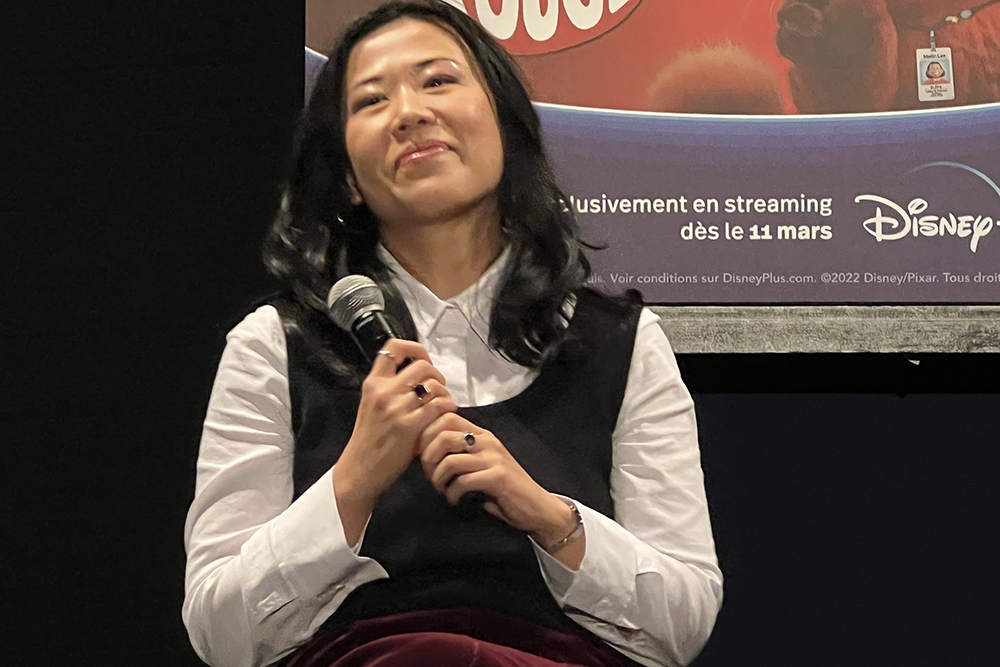
Q : Lindsey, the film is such a feminine one was it really important for you to make sure that there was feminine leadership at the head of this film ?
Lindsey Collins : it was something that we didn't set out to do i would say but we found ourselves with so many amazing choices of leaders at Pixar that were kind of top of their field and the more we were talking with people it kind of just turned out that we looked around and all of a sudden we had placed a bunch of women in these key positions. We have a female writer a female production designer a female supervising technical director for the first time and obviously Domee and then all of us on the production side and i think once we once we kind of started making the film we realized or maybe it's even in retrospect to realize that we kind of having a bunch of women in charge kind of let us be really bold with the storytelling. I think maybe we might have second guessed ourselves a little bit if there had been kind of a majority of men in the room, they would have been like i don't know that seems like a lot like should we really do that whereas with women we were like oh no that happened that totally happened to me by example.
Q : How did you come up with the first ever Boys band in Pixar history and did you think you would make more songs with them ?
Domee Shi : oh good question. Who doesn't want to create their own boy band. It was funny for towns started off kind of as a joke and a much smaller role in the beginning of the movie or at the beginning of production in the first version of the movie but we realized like it felt like a more authentic 13-year-old story if our protagonist's goal is to go to a boy band concert so their role expanded after that and we realized. We actually have to create a legitimate boy band to fill this like bigger role for them.
Lindsey Collins : i think there would have been a riot if we took the boy band out i think we were like forget the boy band i think everybody would have had a mutiny.
Domee Shi : it's like every time we showed them in every version of the movie like everyone loved them so much and we love them so much that their role got bigger and bigger and then they kind of became the heroes of a back degree. I mean we asked Billie Eilish and Finneas O'Connell to write the songs for us like three songs for us one was a confidence booster like we needed a song that her friends could sing to her to like boost her confidence in that scene where she's crying one was a ballad that was like that would play when she gets those like Sailor Moon eyes every time she sees a cute boy and the third one was the hustle song like the hate song everybody knows the hit song that had to have lyrics where someone was making money and hustling and making paper and they were so on board with it and we only got three songs because we could only afford three songs from Billie Eilish.
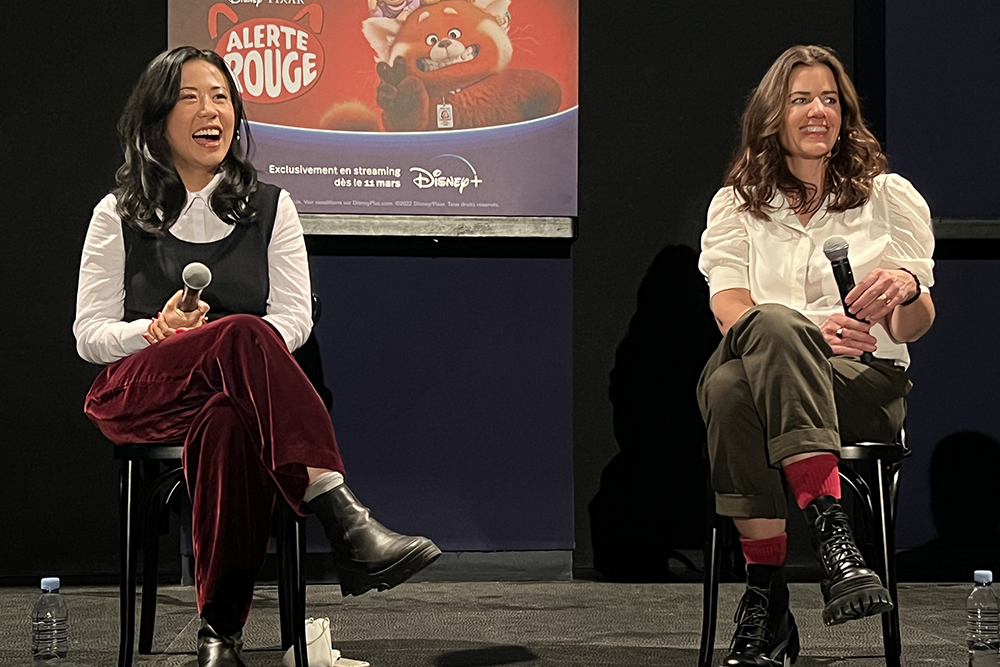
Q : What is your favorite character and why ?
Lindsey Collins : I think, I’m gonna go against type and I’m gonna say Mei is my favorite character i think i feel like i have as a mother i am i look at me and I’m kind of like she's aspirational for me I’m like oh my gosh she's so confident like she's so dorky but so cool like and she's totally fine with the fact that she's different she doesn't try to be popular she's just comfortable in her own skin at the very beginning and i think the fact that she has that confidence and then figures out how to kind of take that not lose that confidence when everything around her changes i love that about her and she's kind of always been that way from the very beginning of kind of your first pitch that was what you pitched.
Domee Shi : my favorite characters are Mei's friends Miriam, Priya and Abby just because they were so fun to write and to draw and to come up with three very distinctive personalities for each of the girls each of them reminded me of friends i've had growing up. Miriam is the more tomboyish girl who pushes me out of her comfort zone who her mom doesn't really approve of Priya represents that more gothic friend who's always into vampires and you know dark like witch core and stuff. Abby is that like friend who's like really tough and who will defend you and she'll like get into in a fight to you know in your honor and yeah i just love all three of the girls i wish they were my friends.
Q : If you can choose to be one of them, which one will you choose ?
Domee Shi : i think i choose to be Priya because I just love her goutiness super chilly and she's very chill like she's always like calm in the face of everything.
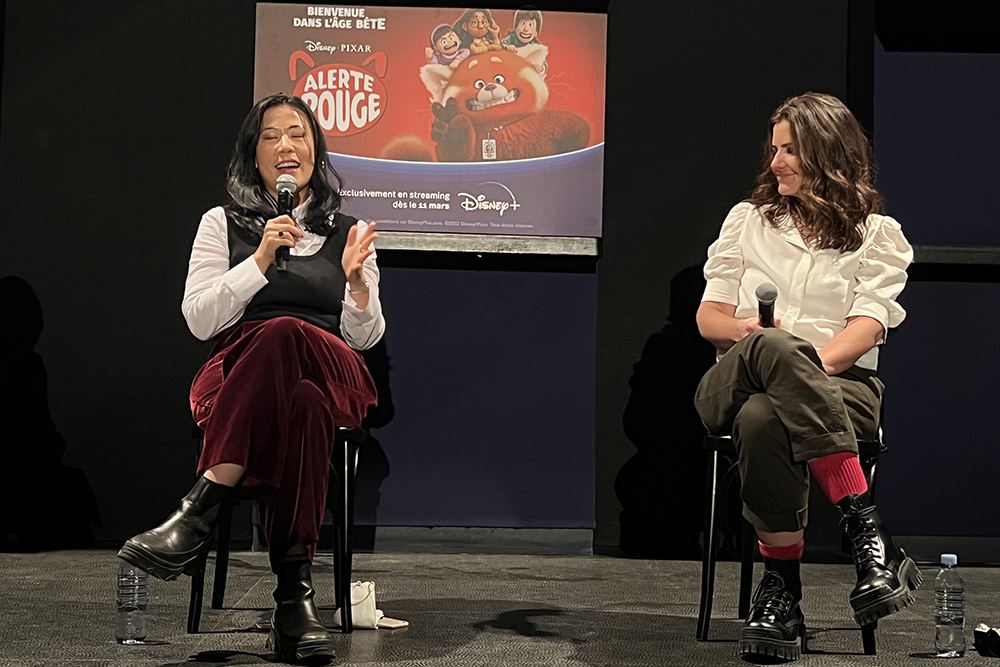
Q : I could still relate to it with the character May because I’m the eldest of my familiars so i've merged a lot of our responsibilities as the big sister and i was wondering if you were inspired like the sisterhood if we can say like that for the friends of Mei and i was wondering where does the energy of Abby came from ?
Domee Shi : so i think this the sisterhood between the girls just comes from my own friendships with a lot of my girlfriends growing up. I’m an only child so i felt like a lot of my friendships in in like middle school in high school and college like I became very close with my friends they were kind of like my siblings so that's kind of like where that closeness comes from and in terms of where the idea for Abby came from she is directly inspired by my real life friend and the voice of Abby Hyein Park who's been my friend since animation school in college and she is this short huge Korean girl who has the scariest voice there's a crap out of who has the biggest scariest voice and when i do karaoke with her she just like blows my hair back with how big her voice. She beats me up all the time out of love.
Q : I was wondering why it took place 20 years ago and not now and also what was your pop culture references for this because it reminded me a lot of Kaiju movies ?
Lindsey Collins :i think well first of all Domee grew up she was 13 in 2002 it's very depressing for me that's true so that kind of made sense but I think it's something we kind of talked about is the fact that there was no social media at in 20 years ago and if you're telling a story about kind of growing up and the kind of pull between your family and your friends the minute you kind of introduce social media that that becomes a whole other poll and there was something really nice about keeping the story very simple and focused on her immediate kind of family and friends that i think you know it's not to say we couldn't have done it in modern times but i do think it actually allowed it to be very kind of personal if you will without the kind of social media aspect to it because god knows that is a whole another red panda social media so there's that.
Domee Shi : you're absolutely right grandma half was definitely one of the one of the references. You know the movie just represents me and my aesthetic and the things that I’m inspired by artistically i grew up loving eastern and western animation equally like i love Disney and Warner brothers just as much as i love Japanese anime studio Ghibli and you can see that in the movie and i feel like you know Mei is a girl who's like kind of a mix of east and west like this movie takes place in in Canada but she's from a Chinese community so it felt right that the artistic references were also kind of combining east and west and i just love how expressive and colorful anime is and especially how they exaggerate emotions and the characters and i love the color palette too of like 90s anime like Sailor Moon like grandma Alf.
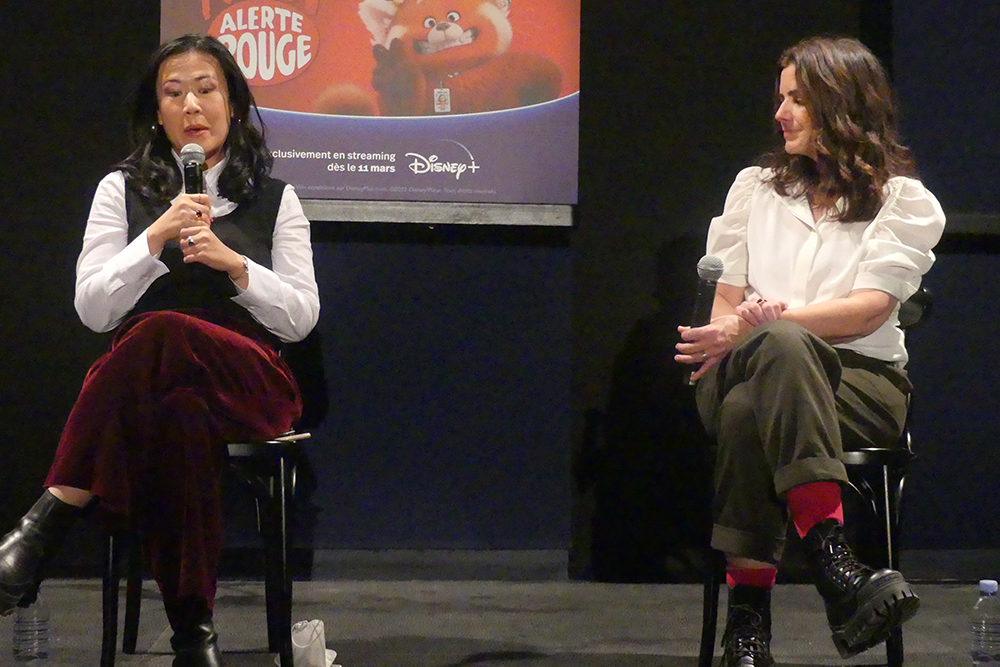
Q : Could tell us about on what after you made the amazing short film Bao what exactly led you to make a full length movie ?
Domee Shi :it was right after i made Bao in 2017 when Pixar approached me to pitch three ideas for a feature film and i knew that all three of my ideas were going to be coming of age stories revolving around girls because that was an important and exciting topic that i really wanted to tackle. I just didn't feel like there were a lot of stories like that in the media and i really wanted to make something like that. Turning Red was i think the most personal out of all three ideas Lindsey knows like i pitched it to her and a bunch of the creative team at Pixar and it was the most personal but also i think the most relatable because even though it was a story about this quirky Chinese Canadian girl who hits magical puberty and poops into a giant red panda everyone on the exec team on the creative team like had that experience of being 13 of waking up one day and not recognizing yourself in the mirror like you've grown a couple feet you're hairy you're hungry all the time and your emotions are all over the place so i think it was the most relatable but also the most personal story.
Q : so the director of Inside Out also did a very personal film about his daughter in some ways we could say did he have any kind of look at this film before any input on this film or not because he's a guy or just not his project ?
Lindsey Collins : i mean Pete would say probably your mentor so i mean and the closest kind of mentor you've got at Pixar and he now actually you know is the chief creative officer of Pixar so everything goes through him and gets his eyes on it and you know we really benefit Pete likes to push style too. He really loves pushing kind of animation and trying different styles and he's also a great kind of advisor about kind of when we were trying to push things he would always kind of come in with a good note about like be careful if you push it too far you know you want to make sure that it's still emotional that you can still relate that you're not losing your audience because you push the animation so he was always a great counterbalance for us and a great advisor throughout.
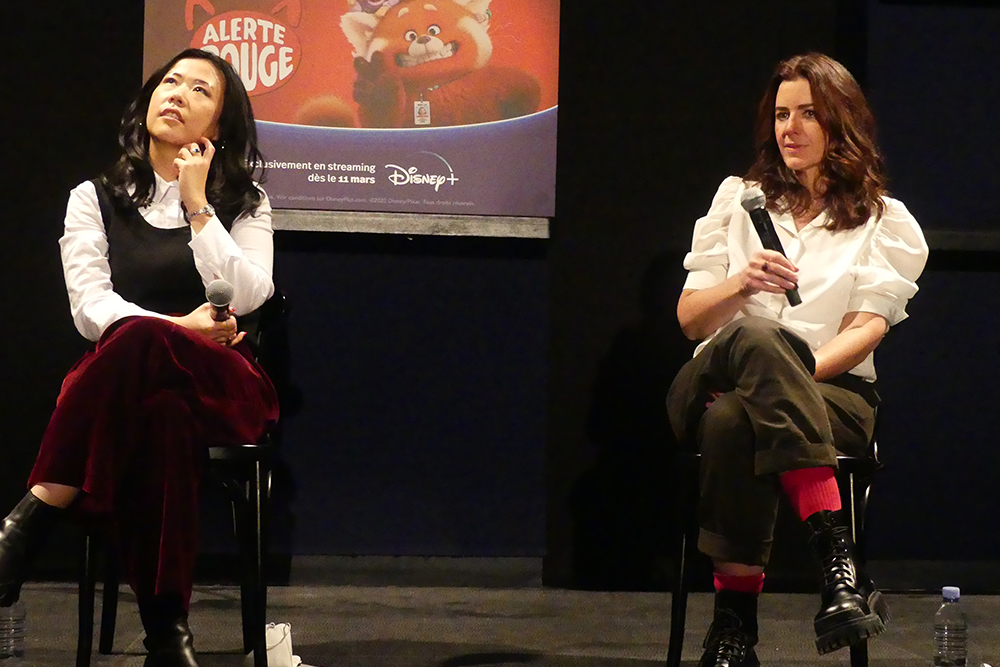
Q : I’m also come from an Asian household so thanks for the movie like I was so relatable so how since you said that you were an only child so how could you push it in this part you know because animation isn't like the thing that your Asian parents would expect you to do becoming a lawyer or a doctor and that's it so. How was it for you and which anime school did you go because I would like to follow your footprints ?
Domee Shi : my parents were exactly like that they were worried for me about getting a job and supporting myself if i went into art but i was able to convince them that animation would be a smart investment for them i pitched it to them not unlike how may pitched for town two to her parents. I said look Disney animators get insurance like health insurance and retirement funds and pensions and all that good stuff and I mean, I am very lucky that my parents have always been very supportive of my dreams like that was never the issue it's more just like okay if you pick this path you better commit and do it right be the absolute, be the absolute best at it like be the best animator and i don't even know what that means. I went to Sheridan college in Canada. They have a bachelor of arts animation program there it requires a portfolio the class sizes are pretty big. It's like hit or miss but i made like some of my best friends there and it's a lot cheaper than ColArt.
Q : i think this question could work for every each of us because we mostly are animators student so during the work of the story how much did you change from the original idea you had because during the production usually you have to change many things and so how much did the story change through the process ?
Lindsey Collins : it changed a lot and that's normal. I think the thing that we had that is such a rare and great thing to have at the beginning is a really strong sense of the characters Mei was always may and Ming was always Ming and so from there everything around them changed what they did how they how they reacted to things and kind of what obstacles were put in front of them if we had eight screenings of the film. I think about seven and a half of them they were the movie was broken and we had to fix things and change things drastically so it's a huge gift to have such a strong sense of character and frankly to have a director that has such a strong vision of what she wants so what was amazing and having you know been on a few films at Pixar was usually about screening five or six you lose all the humor like you just are so tired and nothing is funny anymore and you've changed everything and you're so focused on the plot that you forget about the humor but that was never the case this film because Mei and Ming had such a great kind of foundation it was always funny like no matter what situation you put them in we were laughing so it was just a matter of kind of polishing it over the course of four years. I remember making student films and redoing my film like a million times and just being completely lost in in the weeds and i feel like your guiding compass in those times is your character and being able to like the plot might change how they get from point a to point b it might change but if you can figure out as early as possible who your main character is and what they want and what their personality is that will really help you as you make your films because your plot is always going to change but if you can solidify your character as early as possible they can be your guide towards your final goal.
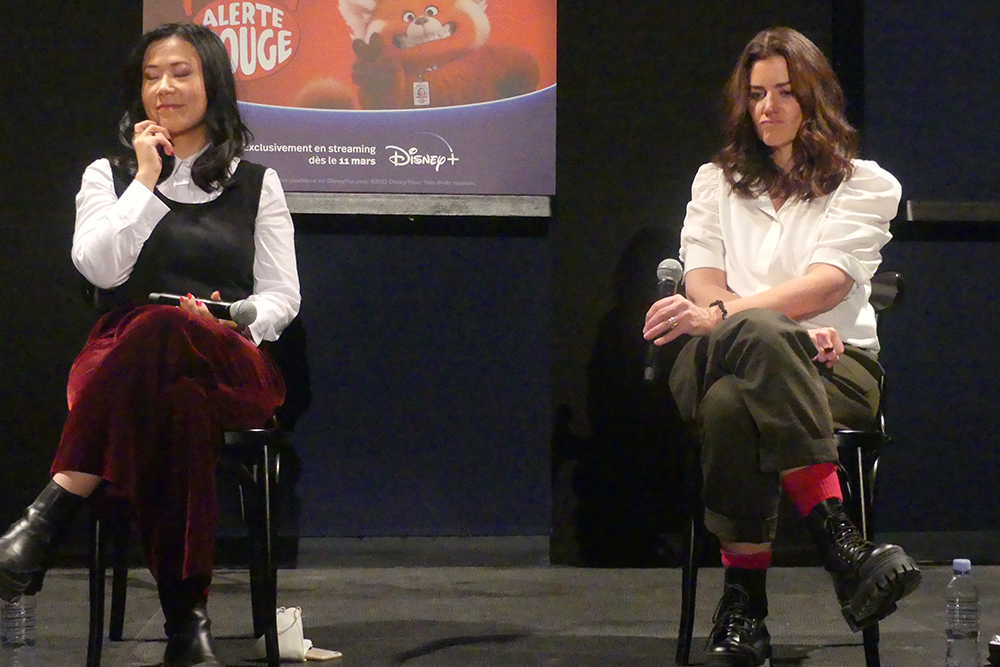
Q : Why did you decide to do a movie about friends, family and a panda ?
Domee Shi : because i think those except for the red panda those are the most important things in your life when you're growing up and when you become like an older kid like when you become an adult those relationships change and that's kind of what it means to grow up is to have new relationships with your family, to have new relationships with your friends your maybe you're going to fight more with your parents or with your friends but that's part of growing up and then the red panda is just a fun metaphor that we came up with to talk about that to talk about the subject of growing up.
Lindsey Collins : because it's not fun to watch a mom and a daughter fight all the time so she's a daughter as a red panda it's much more fun
Domee Shi : more fun to see two pandas yelling at each other.
Our photos of this event can be seen in our Flickr page
Synopsis :
The adventures of Meilin "Mei" Lee, a confident 13-year-old girl who is torn between her overprotective mother's image as a model girl and the chaos of adolescence. And as if all the changes going on inside her weren't enough, every time she is overwhelmed by her emotions - which, for a teenager, happens almost all the time - she turns into a giant red panda!
Turning Red
Directed by Domee Shi
Screenplay by Julia Cho, Domee Shi
Produced by Lindsey Collins
Starring Rosalie Chiang, Sandra Oh, Ava Morse, Maitreyi Ramakrishnan, Hyein Park, Orion Lee, Wai Ching Ho, James Hong
Cinematography : Mahyar Abousaeedi, Jonathan Pytko
Edited by Nicholas C. Smith, Steve Bloom
Music by Ludwig Göransson
Production companies : Walt Disney Pictures, Pixar Animation Studios
Distributed by Walt Disney Studios Motion Pictures
Release date : March 11, 2022
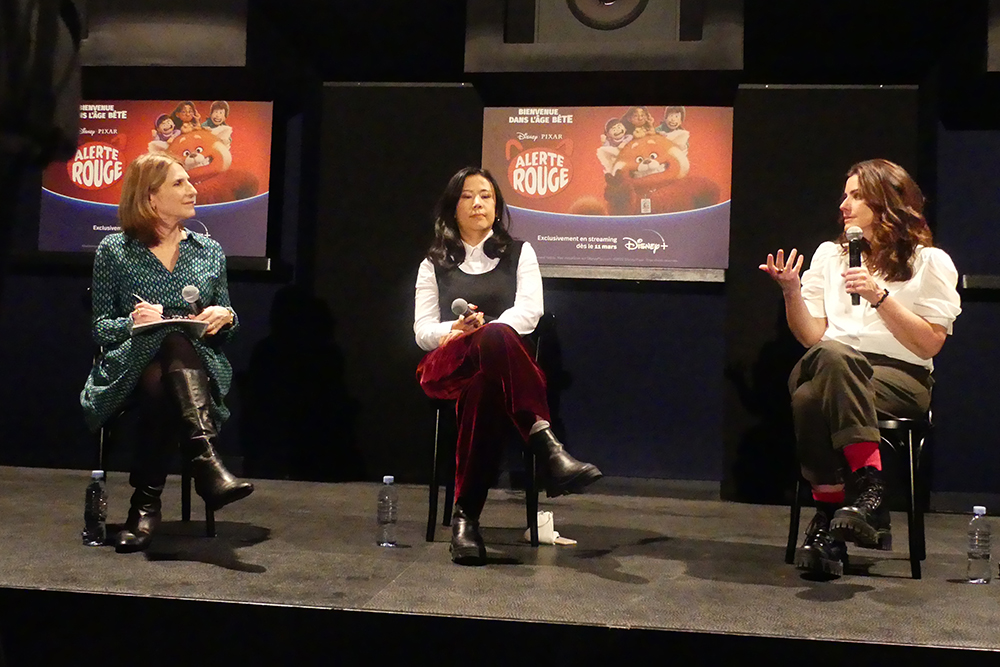
Photos and video : Boris Colletier / Mulderville
Transcription: Boris Colletier / Mulderville
We would like to thanks The Walt Disney Company to invit us to this great event in Paris

